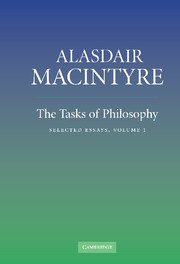Preface
Published online by Cambridge University Press: 05 June 2012
Summary
The earliest of these essays appeared in 1972, the latest as recently as 2002. In 1971 Colin Haycraft of Duckworth in London and Ted Schocken of Schocken Books in New York had published a collection of my earlier essays, Against the Self-Images of the Age: Essays in Ideology and Philosophy, in which I had set myself three goals. The first was to evaluate a variety of ideological claims, claims about human nature and history, about the human good and the politics of its realization, advanced from the standpoints of Christian theology, of some kinds of psychoanalytic theory, and of some dominant versions of Marxism, the second to argue that, although there were sound reasons for rejecting those particular ideological claims, they provided no support for the then still fashionable end of ideology thesis, defended by Edward Shils and others. Yet these negative conclusions would have been practically sterile, if I were unable to move beyond them. And, if I was to be able to move beyond them, I badly needed to find resources that would enable me to diagnose more adequately the conceptual and historical roots of our moral and political condition.
A third task in Against the Self-Images of the Age was therefore to reconsider some central issues in moral philosophy and the philosophy of action. Yet the effect of rereading these essays in 1971, when collected together in a single volume, was to make me painfully aware of how relatively little had been accomplished in that book and how much more I needed by way of resources, if I was to discriminate adequately between what still had to be learned from each of the standpoints that I had criticized and what had to be rejected root and branch.
Information
- Type
- Chapter
- Information
- The Tasks of PhilosophySelected Essays, pp. vii - xiiiPublisher: Cambridge University PressPrint publication year: 2006
